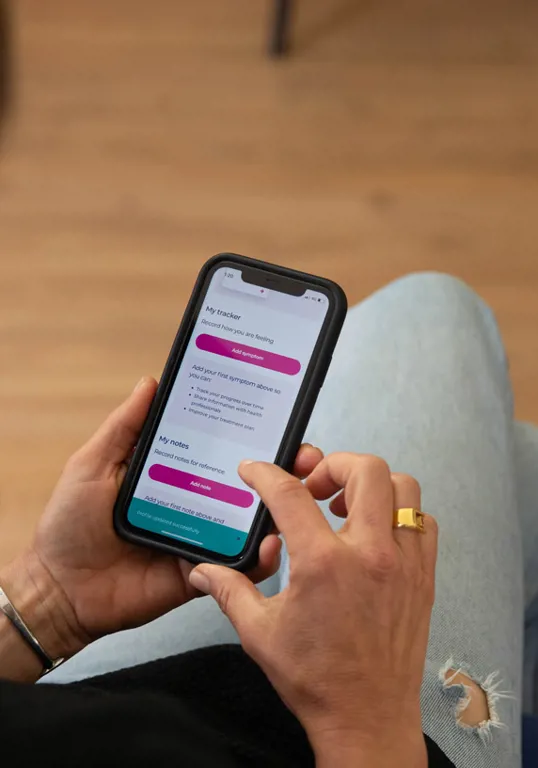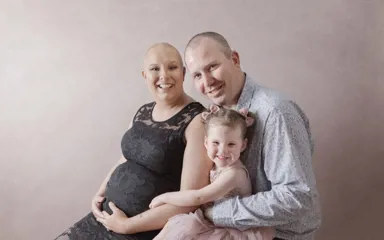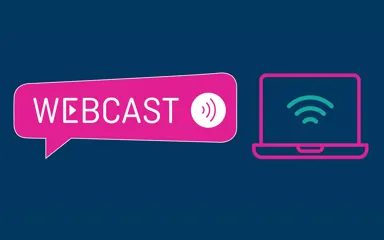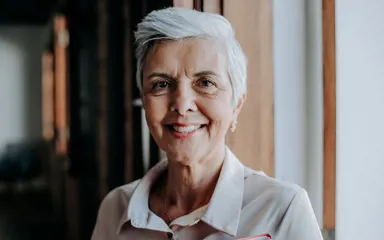Kellie Curtain [00:00:07] Let's be upfront about what happens in the days and weeks after a breast cancer diagnosis.
Kellie Curtain [00:00:12] What's next? Confirmation that you have breast cancer can come as a shock. There's a whole lot of information to take in and decisions to make. Not to mention the emotional roller coaster you may find yourself on. So where do you start? How do you prioritise? Today we're talking to Rosie Brown who is a cancer nurse and works on BCNA's Helpline, and Cat Mitchell, a mother of four who was diagnosed with Stage Two breast cancer a few months ago. Welcome to you both.
Kellie Curtain [00:00:42] Cat, can you remember that feeling when you were told you had breast cancer?
Cat Mitchell [00:00:48] I think it was sadness to be honest. Obviously shock, but sadness because it's like, I've got four girls and I thought "well, what's gonna happen to them and what if I've got bad genes?". And I remember asking the doctor ... I was a bit scared at the time because he didn't say whether I was going to die from it. He didn't say ... like you said it was Grade 2 or they didn't even know that because they hadn't done any operations. But I remember I had to ask him "am I going to die from this?" which I thought was very unreasonable. But I had to ask that of my surgeon. But I did and he said no. And so from the get-go he said you probably won't need chemo or radiation. So even though it was a horrible diagnosis it was also a positive. We're going to. It'll be all right if you're gonna get it. At least it's just a straight mastectomy at least. Mm hmm. Yeah.
Kellie Curtain [00:01:37] Rosie, When you first hear on the Helpline from someone what stage are they usually at? Does it vary?
Rosie Brown [00:01:46] It does vary. It really depends on how people have come to the diagnosis. But a lot of people in the same way that you talked about, Cat, it's a big shock and trying to get a grasp of, "what does this mean for me? What does this mean for my family and what do I need need to deal with right now?". And it's not immediately ... unfortunately it's not immediately apparent to the doctor what ... where you're going to end up and what the pathway will be. So a lot of people find that lack of clarity really challenging to deal with in those initial days and weeks.
Kellie Curtain [00:02:40] When there's so much information to take in, quite often it's recommended that someone take a loved one, a friend ... just someone else as a pair of ears to take along to appointments.
Rosie Brown [00:02:53] Yep. We would certainly suggest that people have a trusted friend that can advocate for them and be that second pair of ears. It's also possible to have the consultation recorded. You just need to know your phone's capable of doing that and it's just an initial request at the beginning of the consultation but it's that gives you the opportunity to listen back and process information more clearly later.
Kellie Curtain [00:03:31] And that's allowed, Rosie?
Rosie Brown [00:03:32] Absolutely. Yes. It's a Cancer Australia recommendation that people are able to have recordings of their consultations.
Kellie Curtain [00:03:43] Because of course the cloud lifts once you leave the doctor or Breast Screen's office.
Cat Mitchell [00:03:52] To have it recorded would be amazing.
Kellie Curtain [00:03:53] Did you think to do that?
Cat Mitchell [00:03:54] I did not even think of it. I wish I had of. It would have answered so many questions.
Kellie Curtain [00:03:57] Of course because you would get a lot more when you can replay something back.
Cat Mitchell [00:04:01] Yeah totally.
Kellie Curtain [00:04:05] So Rosie once someone's had the confirmation at what stage their breast cancer is, usually the next step is then treatment.
Rosie Brown [00:04:14] Yep.
Rosie Brown [00:04:15] So a lot of times when people contact the Helpline it's at that point that they're making treatment decisions and those decisions can be trying to get an understanding of what some of the terminology is and what the pathology, histopathology reports mean but also a confirmation of, "Do I just go with the person that my GP has referred me to? How do I know that I'm seeing the right people for my situation?" And so it's just that whole negotiation of the healthcare system for a lot of people that's very unfamiliar.
Kellie Curtain [00:05:07] It can be quite intimidating can't it. Apart from the fact that you've there's a whole wealth of information and different roads to go down there's also that intimidation of the medical field not only not understanding a lot of the terminology and treatments but also questioning whether one doctor is better for you than another.
Rosie Brown [00:05:29] Yes. And that one of the reasons that we like to connect people early with the BCNA resources is that there is time from the point of getting the diagnosis - the confirmation that you have a breast cancer. There are a number of steps that then happen and some people say "I just wanted to get the surgery over as quickly as possible" and and I understand that kind of impulse ... But there is also time to make some decisions and gather information and your support networks whether they're your informal family and friends support networks.
Rosie Brown [00:06:22] But it's getting more information. So while you can't control the fact that there's been a cancer diagnosis there is some capacity to start controlling how that will be managed. Some people want to get to a team that they feel comfortable with and then maybe abdicate some of those treatment decision making decisions and go with the recommendations of the healthcare team. But other people are prepared to question more and be actively involved.
Kellie Curtain [00:06:57] There's a lot to take in. So is the message there whilst you understand that the immediate reaction is "get this out of me". There's no need to panic. You do have time.
Rosie Brown [00:07:13] Yes you do have time. The other thing I think that people generally are not aware of is that breast cancer, while it's one umbrella term, there's so much variability. So what what will be the treatment recommendations for different people in different situations will have different paths they go down and the early days are about gathering more information and interpreting it for that person's particular situation. So I imagine Cat, with your age ...
Kellie Curtain [00:07:56] Which is?
Cat Mitchell [00:07:58] I was 38 at diagnosis.
Rosie Brown [00:08:01] So being pre-menopausal and having a family but there would need to have been a discussion about potentially treatment might affect your fertility.
Rosie Brown [00:08:18] So that's a whole other need to gather more information and make decisions that won't be part of the process for somebody who is post-menopausal. And likewise if people live in a metropolitan area and actually have choices about where they go and who they see and access to public and private services depending on whether they have private health insurance. Those considerations are different than somebody who doesn't have private health insurance lives in a rural or regional area and is going to need to travel to access more information and and get the treatment plan and the treatment. So the conversation really needs to clarify for people that there are steps and then it will depend on your particular situation about the pathway that you'll go down.
Kellie Curtain [00:09:34] So I guess like anything if you plan if you go into planning mode that's going to save you a lot of maybe angst, a lot of doubling up and perhaps getting information that isn't so useful. Kat when you were when you knew that you what was the treatment that you had to have. And were you confident and did you fully understand what was going on or did you feel like you needed clarification and to seek either confirmation that that was the right choice for you?
Cat Mitchell [00:10:06] From the start I remember yeah he said most likely no chemo or radiation so I was just gonna be a straight mastectomy with recon instant recon which I thought was great obviously.
Kellie Curtain [00:10:20] Did you have any desire to seek a second opinion?
Cat Mitchell [00:10:24] I didn't. I'm a public patient. It was very simplistic but I thought "okay I've got some cancer in my body, we just need to cut it out. It'll be right".
Kellie Curtain [00:10:36] So it was a case of let's just get it out.
Cat Mitchell [00:10:39] Yeah let's just get it out. That's right.
Kellie Curtain [00:10:41] Even though it came at the cost of your breast and reconstruction?
Cat Mitchell [00:10:47] Yeah.
Rosie Brown [00:10:48] I think again that highlight the the the treatment pathway of because of the circumstances of your diagnosis a mastectomy is going to be necessary and we can offer you a reconstruction. When I say "we" I mean the surgeon and the health care team. So then you're what's going through my mind is there are lots of forms of reconstruction. There's a number of options apart from the cancer diagnosis that can be another big procedure. And so we have some resources that can inform people and help them with some of that decision making. The information then helps you ask questions and we can also connect people with other people that have had or are considering reconstruction to get that lived experience of how things went and some practical kind of guidance from people that have been there.
Rosie Brown [00:11:52] So can I ask did you do more exploration or try and connect with other sources of information about reconstruction surgery?
Cat Mitchell [00:12:04] Yep! I got straight online - BCNA Online Network
Kellie Curtain [00:12:05] Not Doctor Google.
Cat Mitchell [00:12:09] No. No way. That only gives you nightmares. Google. Yes straight to the source. And I was mostly googling "Crossfit mastectomy" because I was an avid Crossfitter. So I was more concerned with when can I get back into the gym which is not the most important thing in the world in hindsight. But I remember Googling and asking lots questions about exercise post-mastectomy and [post]-reconstruction. That was our main information. And how long will recovery take.
Rosie Brown [00:12:36] So that was through the Online Network, Choosing Reconstruction?
Cat Mitchell [00:12:41] Yeah.
Rosie Brown [00:12:41] Private group?
Cat Mitchell [00:12:42] Yep.
Rosie Brown [00:12:43] That would have been one of the sources of support and information that the help line would have directed you to because. Yeah. That's that's invaluable really.
Cat Mitchell [00:12:57] It's amazing just having the information of what people have gone through and just they can because it then becomes a known thing and not just the unknown - "what's it gonna be like? What am I gonna look like? Just knowing even little tips what take to hospital.
Kellie Curtain [00:13:12] Is it as frank as that? It's a really open and generous discussion amongst those that really want to share their experience and that others benefit from that.
Cat Mitchell [00:13:20] Yeah for sure and it's good experiences and bad experiences.
Rosie Brown [00:13:25] It's not sugar coated and the reality is about time to recover when things don't go as well as planned and how people have negotiated that sort of stuff. That's that's why it's that that lived experience is just so important I think.
Kellie Curtain [00:14:00] A lot of people private versus public even those that are in the private system sometimes might be better off in the public. So that's an interesting question that has to be asked. And that's somewhere where the Helpline can help.
Rosie Brown [00:14:15] People aren't always aware that they have a choice about where they're treated.
Rosie Brown [00:14:21] And the fact that they could be treated as a private patient in a public hospital if a particular surgeon operates that they say privately operates also in the public sector and that they can swap between the two systems the different parts of their treatment.
Kellie Curtain [00:14:42] So that is possible what some of the ways that you can sort of toggle between the two?
Rosie Brown [00:14:47] So people might choose to see a private a surgeon privately because of their qualifications and if they're having a reconstructive procedure but then have their radiotherapy through a publicly funded hospital public hospital to reduce out-of-pocket costs. We really guide people towards contacting their private insurer and finding out what is covered and being mindful of the fact that in addition to the costs of the charges from the surgeon there will be other health professionals - an anaesthetist pathologist fees and that these can accumulate very rapidly. Ongoing visits to hospital ... Private cover covers time in hospital. If you're seeing a consultant for a day visit that's not rebatable. And people just are really unaware that that's the case. And they have some choices.
Kellie Curtain [00:16:08] Is it okay for people to ask about the upfront costs? Do you recommend that before they even go down that path?
Rosie Brown [00:16:16] So we suggest that it's important that they yes, contact their private insurer but also ask their specialist to give them a quote so that they are absolutely clear about what they're being charged that is not covered by their private health insurance and that it's comprehensive it's not just the breast surgeon's fees but the additional fees of the other people. So transparency in about costs and also letting people know that it's possible to ask if they could be charged on a no-gap basis so that the fee charged by the specialist equates to what is rebateable so that there isn't some shock that they are faced with down the track.
Kellie Curtain [00:17:13] Which can be extremely stressful. Cat, even as a public patient have you suffered out-of-pocket costs?
Cat Mitchell [00:17:20] Yes. I had an MRI that was $300 per breast, I had both checked out. So that was a lot of money and then further down the track they started saying actually maybe you might benefit from chemo. So but I was borderline so we did a Endo predict test which was a couple of thousand but that came back saying definitely no chemo. So it was worth it in my opinion.
Kellie Curtain [00:17:40] You still have four children! It's still expensive!
Cat Mitchell [00:17:44] And then genetic testing... That's another $450.
Cat Mitchell [00:17:47] Which is worth it because I've got four girls I want to know what their future is.
Rosie Brown [00:17:51] It's the knowledge so that you can make an informed decision and say "you know I'm happy to pay that out-of-pocket cost for the information that it will give me". And that's very different from not being offered those tests in the first place because somebody assumes that because you've got four kids and you're going through the public system that you are unable to prioritize or access the money to pay for some of those tests. MRI has been part of your planning before surgery and then those other things coming you know further down the track. But it's really knowledge is power. That whole. And choice and your right to know and then say I'll go with it or I choose not to because really that's not of value to me.
Kellie Curtain [00:18:47] Rosie you would receive many different questions and concerns on the Helpline. I imagine one of them that would be quite common. Would be that someone who has been diagnosed and a treatment plan been devised then changes and sometimes that can be really unsettling and make someone perhaps lose confidence in their team. Is is that founded?
Rosie Brown [00:19:13] So the series of is a series of tests and surgeries which are really steps towards gathering more information. So hile there might be an idea that someone will go along a particular path one of the results of the surgery might actually change that pathway. So it's really that more information is being gathered and then the pathways tailored based on that information.
Kellie Curtain [00:19:51] So it's not an indication that your professional team don't know what they're doing or that they've missed something?
Rosie Brown [00:19:56] In fact it's an indication that your team is really looking at all of the important bits of information and then tailoring a treatment plan that's best for you rather than having made an error somewhere.
Kellie Curtain [00:20:12] Cat did you can you relate to that? Because it must be one thing to get your head around right. I'm having a mastectomy and then all of sudden it's like oh hang on you didn't think I need chemo but now you think I do and then you didn't.
Cat Mitchell [00:20:27] Yeah that's exactly what happened and I was post-surgery when they brought up the chemo question. And luckily I was a borderline case. So I was able to make a decision to do a test make a decision not based on the results but it was quite unsettling because all along you just have the future ahead you think you know what the future is with your treatment and then it changes and oh my goodness. It's really crazy little thing. It's not really a little thing but little things really can flip you out.
Rosie Brown [00:20:55] I think the whole loss of control with a diagnosis in you your world being flipped upside down. People really try and latch on to clarity and a clear path and the reality is that there needs to be a certain amount of information gathered before the pathways clear and in in whatever happened in your situation there was a point where they thought is there a possibility that Cat might benefit from chemotherapy and we don't want to deny her that in terms of reducing risk. So yes it's it's not that somebody as as you said somebody just thought Oh hey maybe we should check this out. It's actually based on further information that is being gathered as people go along.
Kellie Curtain [00:21:54] So yet again I think the help. That's a really good message about BCNA's Helpline is that you're there to support and give clarity around possibly those decisions that have been made and reassure people and no question is too silly I guess that when people ring up.
Rosie Brown [00:22:17] Lots of people ring up and say "Oh as soon as I left the room I had a whole lot of questions". Now we might not be able to answer those questions for people directly but we can certainly validate the questions and perhaps help people to tailor the questions and go back in and ask them what makes it all make sense of the information they've been given and processing information and really understanding it is something that we do a lot of in the conversations and then provide people with other tools or resources where they can reinforce that by watching a video or reading something or talking to other people online. So it's it's a a whole other world for people. And it takes a while to get your head around what it all means. And we do often have repeat calls from people where we're just clarifying and reassuring people and also validating that it's okay it's okay to ask this again and we'll try and you know deal with it differently.
Kellie Curtain [00:23:32] And the online tool that BCNA now has must also complement that.
Rosie Brown [00:23:39] The beauty of the online tool is that people's particular situations direct what information they see. So under the various topics Cat would see information about it would have a prompt about a conversation about fertility would have come up for you. Your postcode would indicate you know whether you're in a metropolitan area or not. And then under the various topics that you choose to go down these information relevant for your situation.
Kellie Curtain [00:24:25] Which is great isn't it, because traditionally in the My Journey Kit there's a lot of other stuff that's not relevant to you. And then it can seem even more overwhelming because you've got this huge volume and the online tool really allows you to tailor it to your age group to your specific diagnosis and the things that matter to you.
Rosie Brown [00:24:48] So you might see something that you never would have thought about but you can bookmark that and come back and read it later and you can share things by emailing them with friends or family. So choosing a particular treatment path because it's been recommended you might understand it and be happy with your decision. But if somebody else in your family ask a few questions it might be really hard to give that neat explanation. So you can find more information that actually captures all the key bits of information you can email that to somebody else in the family and then they've got it in writing and then you can discuss it but it's sort of that sharing of information and it can make some of those communication challenges easier for people.
Kellie Curtain [00:25:45] And maybe save you from having to have the conversation.
Kellie Curtain [00:25:49] Cat, you're only a few months post diagnosis and you're still having rehab with the benefit of hindsight is there anything that you might have done differently or is there any thing that you'd like to share maybe with someone who might be listening who's just been diagnosed as a bit of a tip?
Cat Mitchell [00:26:09] Well to be encouraged it's not ... it hasn't been a horror story for me. I mean obviously cancer is really shitty but it's still there's still joy in my life. It really shows you who your community is. The people who love you and allowing them to be a blessing and a support to you is amazing like it's been an amazing experience.
Kellie Curtain [00:26:30] So is the message don't try and do this alone?
Cat Mitchell [00:26:33] No, oh my goodness, accept help. I'm such a proud person so having all these people cook for me ... it's humbling but I'm so glad that I did it.
Kellie Curtain [00:26:41] Thank you for joining us.



















Listen on